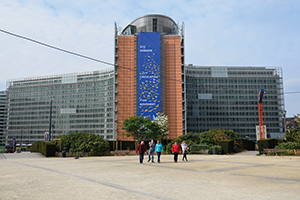Building social enterprise in Europe

A recent meeting of the Employment, Social Policy, Health and Consumer Affairs (EPSCO) Council in Brussels agreed to aid the growth of social enterprises across Europe and has put recommendations in place to tackle long-term unemployment.
EU Ministers for Employment, Social Policy Issues, Equal Opportunities and Health met in Brussels recently for a meeting of the Employment, Social Policy, Health and Consumer Affairs (EPSCO) Council. High on the agenda were the issues of the social economy and integrating the long-term unemployed into the labour market.
EPSCO Council
The EPSCO Council recognises the social economy as a key driver of economic and social development in Europe and has called on member states and the Commission to develop European, national, regional and/or local strategies and programmes for enhancing the social economy, social entrepreneurship and social innovation. It also wants to see an improvement in the visibility of the social economy and in the collection of information on it in order to demonstrate its effective contribution to the major macro-economic aggregates.
There was also agreement around the need to develop and support the dissemination of knowledge and experience regarding social economy enterprises and the need to develop and pursue effective ways of involving young people in the social economy. To achieve better social outcomes, the council has called for more systemic promotion of social innovation in European and national programmes and stresses the need to continue to develop an appropriate ecosystem for social economy enterprises at EU and member state level.
With regards to the important issue of access to finance for social enterprises, the council came to the agreement that in order to establish a comprehensive financial ecosystem and enable the development and growth of social economy enterprises, there is a need to analyse which financial instruments are the most appropriate and promote their dissemination with the council of the belief that there is more to be made of the European Structural and Investment Funds.
The council also wants to see the Commission take into consideration social economy, social innovation and social investment policies when reviewing the Europe 2020 strategy. It also expressed its desire to see social economy enterprises and social entrepreneurs become actively involved in the development of European policies and strategies.
Luxembourg declaration
Prior to this meeting, six EU member states – France, Italy, Luxembourg, the Slovak Republic, Slovenia and Spain adopted the Luxembourg declaration which recognises the increasing importance of the social economy at both European and international level and recognises the social economy as a model that has weathered the economic crisis better than many others. The declaration calls for:
• the European Union to acknowledge a common understanding of the scope of the social economy and remain respectful of its huge diversity and historical background across all member states;
• the social economy to benefit from more than the size of the European market. For most social economy enterprises, the internal market remains far from being a tangible reality. Therefore, the declaration wants to see the social economy included in the modernisation of the single market strategy;
• European support of social economy enterprises to be strengthened and included in programmes, projects, funds and other financial support instruments to be adopted;
• a particular importance to be given to the development of an adequate financial ecosystem capable of providing effective support for the social economy and social innovation;
• greater promotion of high-level meetings between political representatives in charge of the social economy in all European member states to lay the foundation for enhanced cooperation.
Tackling unemployment
On the topic of the long-term unemployed, the council accepted the recommendations made by the European Commission in late 2015. The recommendations are based on the model youth initiative, Youth Guarantee which aims to target long-term jobseekers over 30 and those aged between 25 and 30 who do not benefit from the Youth Guarantee.
The council recommends that member states should encourage the registration of jobseekers with the relevant services and the introduction of integration measures more closely linked to the labour market, particularly through closer links with employers. It also stresses the need to provide registered long-term jobseekers with individual assessments and to offer them job integration agreements no later than when they have been unemployed for 18 months.
Community assets stimulate enterprise
 Community empowerment is at the heart of the work of Development Trusts NI. DTNI is the leading network of local area regeneration organisations in Northern Ireland with the principles of community ownership and community enterprise at their core. DTNI is dedicated to the development needs of member organisations supporting them in their local regeneration efforts and assisting them to explore and develop enterprise opportunities, local ownership models and to grow successful community businesses.
Community empowerment is at the heart of the work of Development Trusts NI. DTNI is the leading network of local area regeneration organisations in Northern Ireland with the principles of community ownership and community enterprise at their core. DTNI is dedicated to the development needs of member organisations supporting them in their local regeneration efforts and assisting them to explore and develop enterprise opportunities, local ownership models and to grow successful community businesses.
Development Trusts focus on stimulating local economies, creating opportunities for local employment and delivering local services. DTNI advocates on behalf of members with statutory commissioners and procurement interests to ‘Keep it Local’ to create and maintain locally provided services where third sector organisations are the deliverers.
“Communities must continue to be supported to become enterprise focussed and the Northern Ireland Executive’s focus on providing communities with an opportunity to develop an asset base through the re-use of surplus public estate is a welcome intervention,” said DTNI’s Programme Manager, Charlie Fisher.
DTNI has partnered with the Department for Social Development to test the Community Asset Transfer policy agreed by the Northern Ireland Executive in May 2014 facilitating a project demonstration programme.
One such successful asset transfer was pioneered with Broughshane and District Community Association who partnered with Triangle Housing Association to acquire the surplus police station in the town and convert it to a community building plus social housing. Partnership working with (then) Ballymena Borough Council and NI Housing Executive brought this exciting project to fruition.
DTNI provides a range of servces including: advice and support on the acquisition and management of community assets and in particular on Community Asset Transfer.





